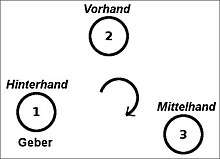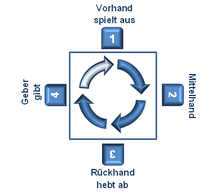Card player

Forehand, middlehand and rearhand/dealer in a 3-player game

Bidding sequence in Schafkopf:
1: Forehand, leads to 1st trick
2: Middlehand
3: Rearhand, cuts the pack
4: Dealer, deals the cards clockwise
1: Forehand, leads to 1st trick
2: Middlehand
3: Rearhand, cuts the pack
4: Dealer, deals the cards clockwise
Card players are those participating in a card game. Various names are given to card players based on their role or position.
Position
In games played in English-speaking countries, age refers to the order of priority in which players make the first lead, bid or bet, based on their position at the table.[1] This changes constantly as the dealer rotates either clockwise or anticlockwise around the table. They are traditionally referred to as follows:
- Eldest hand or elder hand: the player who enjoys greatest priority and e.g. is the first to receive cards in the deal[2][1]
- Youngest hand or younger hand: the player who has the lowest priority and who e.g. is the last to bid or play at the start of a game (often the dealer).[1]
In games originating in Europe, the players' priority is indicated as follows:
- Forehand: the player who leads to the first trick.
- Middlehand: the player between forehand and rearhand in a 3 or 4-person game. In Skat (and similar 3- or 4-hand games), the second player in turn to bid.[3]
Roles
Players may also be referred to by their roles as follows:
- Cutter: the player whose is entitled to cut the cards; usually the opposite side of the dealer to forehand (or eldest/elder hand).
- Declarer: the highest bidder, who declares and then strives to make good the stated contract.[1]
- Defender: a player who plays against the declarer, usually with other defenders.
- Partner: a player who plays co-operatively in a team and who shares the winnings or losses. Partnerships may be fixed for the whole session or vary from deal to deal.[1]
- Soloist: a player who plays a Solo game,[1] i.e. plays alone, as the declarer, against 2 or more other defenders.
References
- 1 2 3 4 5 6 7 The Language of Cards at www.parlettgames.uk. Retrieved 4 August 2018
- ↑ Eldest hand' at www.merriam-webster.com. Retrieved 4 August 2018
- ↑ Middlehand' at www.merriam-webster.com. Retrieved 4 August 2018
- ↑ Hinterhand at duden.de; retrieved 7 July 2017.
- ↑ Dealer at www.merriam-webster.com. Retrieved 4 August 2018
- ↑ Dealer at dictionary.cambridge.org. Retrieved 4 August 2018
This article is issued from
Wikipedia.
The text is licensed under Creative Commons - Attribution - Sharealike.
Additional terms may apply for the media files.